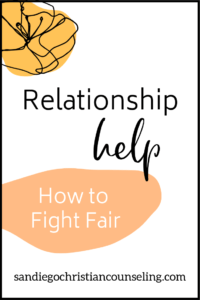Are you looking for relationship help regarding fair fighting rules for relationships? Do you find yourself getting into heated arguments with the same person regarding the same issues, over and over again? Perhaps you end up fighting over the smallest of things and never being able to bring the issue to an acceptable resolution. San Diego Christian Counseling can provide valuable guidance in these situations.
This article will discuss some suggestions for fair fighting rules so that you’re in a better position to have effective conflict resolution in your relationships.

Rules for Fair Fighting in Relationships
Ask yourself why you’re upset in the first place.
If you’ve ever begun arguing with someone simply because you’re upset, you’re not alone. It’s actually really common. For example, you might return home from work after a really long day and find that no one has bothered to tidy up or even wash the dishes they’ve used.
 Before you know it, you’re yelling at the kids, your partner or your roommate, yelling that they need to start cleaning up after themselves and start being more responsible. Later, you begin to regret the way you reacted and find yourself beating yourself up because of your overreaction.
Before you know it, you’re yelling at the kids, your partner or your roommate, yelling that they need to start cleaning up after themselves and start being more responsible. Later, you begin to regret the way you reacted and find yourself beating yourself up because of your overreaction.
One of the key ingredients of fair fighting is being able to figure out why you are upset and how this can lead to picking a fight for the smallest of reasons.
For example, in the scenario above, it may be that earlier in the day your boss was yelling at you and took you off the big project that you’ve been working on for weeks. Being upset isn’t a justification for taking your feelings out on others, so it’s important to learn to recognize when you’re upset before you start overreacting.
Mindfulness techniques can help you to recognize your feelings before they become your justification for starting a fight. Mindfulness keeps you in the moment and helps you to be much more aware of your emotions.
If you tend to pick fights when you get home from work, you can try taking a few deep breaths and some time to explore your feelings before you go in the house so that you don’t mistake seeing a messy house as the cause of your upset.
It can be helpful to have a place in your home that you can retreat to, a place that is solely yours so that you can calm your emotions and get back to a more settled baseline.
One issue at a time
Do you find that you can start fighting with someone over a really small issue which quickly becomes a much more complicated fight about something much bigger? This is a common problem, and these kinds of fights can quickly become emotionally draining.
For example, if you’re driving somewhere with your partner and they take a wrong turn, you may start fighting about that, but it quickly escalates into a much more heated argument about the way that he never listens to you or respects your opinion.
If you commit to only fighting about one issue at a time, then in this scenario, your fight would just be about taking the wrong turning. Abiding by the one-issue-only rule means that you’re not allowed to bring other issues into the fight. It can take a lot of work and a lot of time to be able to completely stick to this rule, but it will set you on the track towards being able to resolve issues by focusing on finding a solution.
One way to try to stick to a single issue is to make a list of things you want to bring up and gradually tick these off as they’re discussed, one at a time. By doing this, you stay focused and are less likely to try to bring all of the issues into one almighty fight.
Avoid using degrading language
 When you’re feeling overwhelmed or your emotions are really running high, the language you use tends to become more derogative. Calling someone a mean name can feel like a good release of the anger you’re feeling but it won’t help the situation. Derogative and degrading language can quickly escalate an argument into a much more serious fight because it makes the other person defensive.
When you’re feeling overwhelmed or your emotions are really running high, the language you use tends to become more derogative. Calling someone a mean name can feel like a good release of the anger you’re feeling but it won’t help the situation. Derogative and degrading language can quickly escalate an argument into a much more serious fight because it makes the other person defensive.
There’s no way that a fight can be productive if you are resorting to degrading language. It is, therefore, a good idea to find less antagonistic ways of releasing your anger in order to keep an argument productive.
For example, instead of yelling, “you’re an idiot” at your partner, you could instead ask, “I don’t understand why you think it’s okay to behave like that, can you explain your reasoning?” It’s much more productive to ask questions rather than to jump to conclusions.
Alternatively, if your emotions are really heightened and you don’t feel able to have a discussion without it turning into a huge fight, you could try writing down what you would like to say and they tearing it up or burning it. That way you get to release your anger and use all the degrading language you like, but it doesn’t cause a massive fight. You’re in a better position to have a less heated discussion later.
It’s also important that you ensure that you’re fighting about an issue rather than fighting about the things you don’t like about the person you’re fighting with. For example, if you’re fighting about the dishes not being done, you shouldn’t make the fight about the person being lazy and irresponsible because taking that approach is degrading the person rather than seeking to understand reasons why the dishes haven’t been done.
Take responsibility for your feelings and express them with words
Emotions can be expressed in a variety of different ways, not just through words. You can express your feelings through your tone, your volume and other types of non-verbal communication such as the way you stand and the expressions on your face. For fair fighting, you need to learn how to express your emotions using your words, not these other ways.
For example, if you’re feeling angry, say “I’m angry” rather than yelling or becoming aggressive. If you’re feeling disappointed, say “I’m disappointed”. When you use “I” statements, you are taking responsibility for your emotions.
When things get heated and accusations start flying, it’s common to fall into the pattern of making “you” statements and putting blame on the other person. For example, “you make me so angry!”
 Using “I” statements can make arguments much more productive. You’re talking about how you feel without blaming someone else. For example, if your teenage son stays out past his curfew and you wait up for him, worried that something has happened to him, your emotions will be running high. He doesn’t pick up his phone but eventually sneaks in two hours past his curfew. Your immediate reaction, based on your emotions, might be to yell at him and make “you” statements.
Using “I” statements can make arguments much more productive. You’re talking about how you feel without blaming someone else. For example, if your teenage son stays out past his curfew and you wait up for him, worried that something has happened to him, your emotions will be running high. He doesn’t pick up his phone but eventually sneaks in two hours past his curfew. Your immediate reaction, based on your emotions, might be to yell at him and make “you” statements.
If you make “I” statements instead, such as “I get worried for your safety if you’re not home when I expect you to be and I can’t get you on the phone. Next time, I just need you to let me know where you are,” you’re owning your feelings and explaining them. This approach is more productive and may mean that your teenager will answer his phone next time he misses his curfew and you phone to check if he’s okay.
Take turns talking
It sounds easy to take turns talking since that’s how we know that conversations work. In fights, however, it’s much more difficult to hold back and wait for the other person to finish talking. You might interrupt or talk over them or yell over them. This can then become a vicious cycle where the other person feels justified in interrupting you because you interrupted him.
That’s not a productive way to fight, because neither of you is going to feel heard. Feeling heard is one of the most important aspects of having a productive fight. If you get frustrated that your partner isn’t listening, then they must feel the same way.
Learn to respect each others’ right to be heard, and allow for pauses so that you’re both able to collect your thoughts and think about what to say next. Pauses are not opportunities to jump in and continue your side of the fight. If one of you is breaking this rule, you should not continue the fight, but rather take a break and wait until you’re both able to abide by the rules.
Avoid stonewalling
Stonewalling is a term that’s used to describe a situation where you shut down and stop participating in the fight. In some cases, this is because you don’t want to argue, or you feel that “if you can’t say something nice, don’t bother saying anything at all.” This attitude is more common if the relationship is more superficial and expressing your true feelings might not be the best approach.
In long-term or serious relationships, however, stonewalling is a problem. That’s because the emotions that you have don’t just go away when you shut down. They simmer away in your mind, festering like open wounds, and negative feelings tend to grow until you reach the boiling point and all those feelings just erupt in a massive argument.
For productive fighting, you need to express your feelings in the moment. Problems can be solved when you talk about them but keeping them festering away doesn’t solve them. You can use phrases that start with “I feel” or “I noticed that I was thinking” to discuss how the conversation or argument is making you feel.
Don’t yell
Yelling is one of the things most commonly associated with fighting, so why would it be against the fair fighting rules? The answer is because when you’re yelling you’re using your tone and volume to express how you’re feeling rather than expressing your emotions in words. When you yell, all the other person is focused on is the yelling. They don’t take in the words, they just focus on the fact that you’re yelling at them. Yelling makes people defensive, too.
If the other person in the fight feels that you are attacking them with the tone and volume of what you’re saying, things can quickly escalate, and a simple disagreement can become a nasty fight. Lower the volume, try to neutralize your tone, and you’re in a much better position to have a positive resolution to the argument. Be mindful that raising your voice can seem like yelling to some people, too.
Take a timeout when the fight is getting heated
 There are points in a fight when things have gone beyond the point of having any possibility of resolution when you’re both yelling and screaming and breaking all the rules of fair fighting. At this point, taking a break from the discussion is the best solution. It’s okay for both of you to walk away from a fight when you’re too emotional to be able to keep to the rules.
There are points in a fight when things have gone beyond the point of having any possibility of resolution when you’re both yelling and screaming and breaking all the rules of fair fighting. At this point, taking a break from the discussion is the best solution. It’s okay for both of you to walk away from a fight when you’re too emotional to be able to keep to the rules.
Taking a break from the argument doesn’t mean that it’s over and that one of you has won. You will have to go back to the conversation at some point but ensure that you’re both in the right frame of mind when you do reopen the conversation. In the meantime, practice skills like mindfulness to help you manage your emotions during a fight better.
Reach a compromise
First of all, it’s important that you realize the difference between compromising or an understanding and coming to an agreement. A compromise is not agreeing that the other person is right, nor is coming to some kind of understanding. You have no doubt heard the phrase “agree to disagree” – that’s what it means to compromise.
When you come to an agreement or decide on a compromise, you are both agreeing that the other person’s opinion is valid. For example, if you’re engaged in a fight about a TV show, it’s possible to validate the other person’s view about the show, while maintaining that you have a different opinion. With more serious issues, like buying a new house, a greater level of compromise will be necessary, however.
For example, if you’re house hunting and you just can’t come to any kind of agreement, you may need to find a compromise by choosing a property that meets some of your individual demands. It might be that there’s a house that has the living room that your partner wants, but you’re not keen on. However, you do love the pool in the backyard, so you’re able to compromise on other features because the house has some things that each of you likes.
In some cases, the other person may be unwilling to make a compromise – for example, with regard to the number of children they want. In those cases, you may need to respect their boundaries and come to an understanding instead of a compromise. If you’re the man in the relationship, you need to recognize that it should be a joint decision with your wife as to how many children you will have.
Getting relationship help from a Christian counselor
It can be daunting to explore the idea of finding a therapist to help with your relationship but getting professional help can make a lot of difference. There are lots of therapists who are experienced in working with couples who have a volatile relationship and struggle with keeping to fair fighting rules.
Find therapists in your local area and schedule appointments with several of them. Often initial sessions are free or discounted, so you’re able to try different therapists to find the one that is the best fit for you. You should be looking for a therapist that you feel comfortable with, who welcomes you and your partner and makes you feel supported.
Look through the profiles of Christian counselors at San Diego Christian Counseling who specialize in offering therapy to couples and in aspects of communication. You should ask any questions that come to mind in order to find out whether a particular therapist is going to be right for you and your partner. Even if the first few that you try aren’t a good fit, keep looking. There is bound to be a therapist who will be able to help you and your partner work through your issues with fighting.
Photos:
“Married Fight,” courtesy of Gratisography, pexels.com, CC0 License; “The Boxer”, Courtesy of antfrank, Pixabay.com, CC0 License; “US”, Courtesy of Harsha K R, Flickr.com, CC BY-SA 2.0 License; “They ARE”, Courtesy of Celynek, Flickr.com, CC BY 2.0 License


